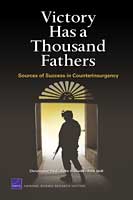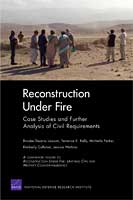 Self-Serving Goo–Useful as a Light Primer, June 17, 2008
Self-Serving Goo–Useful as a Light Primer, June 17, 2008
Richard A. Clarke
Edit of 28 June to acknowledge Retired Reader's comment in favor of the author. I yield to his more direct knowledge. In the larger context, however, all of our civil servants and flag officers failed to do their duty to the Constitution (as did Congress, abdicating on Article 1).
I was hoping for more from this book, but a close examination of the chapters, the notes, and the recommendations quickly established that this book is largely self-serving goo intended to make money and profit from one public moment that I thought was as contrived as Ollie North's shaking his head over the dead Contra during Congressional testimony.
There is NOTHING is this book that has not been known to all of us who actually cared about intelligence reform and who did as much as humanly possible, especially in 1992, to get a National Security Act of 1992 passed, an Act that was destroyed by Senator John Warner (R-VA) and Dick Cheney, then Secretary of Defense.
I find this book especially annoying–to the point of anger–because both Senator Obama and Senator McCain are surrounded by very old dogs long overdue for total exile, and young to middle age staff pukes that are part of the “don't make waves, go along with institutionalized insanity.” The next Administration, regardless of who wins, is going to have no one with a radical iconoclastic brain or an open mind. Voters should take great care in understanding with precision the money and the minds (I use the term loosely) that are “behind” the front running for President.
The idiocy and myopia of Clarke's self-congratulatory and sanctimonious pontification can be readily discerned if one takes a moment to digest a few facts:
1) The world is unconquerable. Get over it.
2) The US is best friends with 42 of 44 dictators, ostensibly because they support the war on terror (a tactic, not an enemy) while sucking our treasury dry in getting arms and training for looting their own commonwealths and repressing their indigenous peoples.
3) There are ten high-level threats to humanity, as identified by LtGen Dr. Brent Scowcroft, USAF (Ret) and other members of the international panel, and I list them here to place the narrow, inflammatory, deceitfully presented Clarke book in perspective–note that terrorism is next to last in this list, and only because of the potential for catastrophic consequences:
— Poverty
— Infectious Disease
— Environmental Degradation
— Inter-State Conflict
— Civil War
— Genocide
— Other Atrocities
— Proliferation
— Terrorism
— Transnational Crime
I won't bother to list the twelve core policies from Agriculture to Water, or the eight demographic challengers that must be wooed with an EarthGame that demonstrates how we can create a prosperous world at peace without repeating the mistakes of the West. Clarke has no clue how to manage a government, balance a budget, articulate reality to We the People, or stand up to those who wear their rank on their foreheads with little else in their brain housing group.
This is the last book I am going to buy by anyone who has served in this or any recent Administration. These are the losers that got us into today's mess–losers who valued their jobs more than the truth, their perks more than our lives.
One cannot have a government that functions when Congress has abdicated its Article 1 authorities; the media is owned by those who would happily consent to 935 lies and 25 documented impeachable offenses by Dick Cheney, and a public that is oblivious to the perils, perils that escape them because the USA is no longer a smart industrious nation.
ENOUGH. It is time to take the 27 secessionist movements seriously, to have a Citizens' Summit (Chicago, on Lincoln's Birthday 2009) and to demand both an Electoral Reform Act and a Smart Nation-Multinational Information Sharing Act. Senators Hagel and Feingold, with their recent call for a commission to draw a new map of the world, are on the right track. Sadly, they are most likely to draw on all these self-congratulating peons who have been happy to be lions to the public, and ants in the White House.
Vastly better more relevant books include:
The Unconquerable World: Power, Nonviolence, and the Will of the People
Breaking the Real Axis of Evil: How to Oust the World's Last Dictators by 2025
Web of Deceit: The History of Western complicity in Iraq, from Churchill to Kennedy to George W. Bush
Vice: Dick Cheney and the Hijacking of the American Presidency
Breach of Trust: How Washington Turns Outsiders Into Insiders
Running on Empty: How the Democratic and Republican Parties Are Bankrupting Our Future and What Americans Can Do About It
The Health of Nations: Society and Law beyond the State
On a positive note, see:
The Cultural Creatives: How 50 Million People Are Changing the World
Society's Breakthrough!: Releasing Essential Wisdom and Virtue in All the People
Collective Intelligence: Creating a Prosperous World at Peace
Our government did not fail us. We failed our Republic, and gave it up for dismemberment. Our government did not fail us. The individuals who served in the highest elected, appointed, and civil service positions failed to honor their Oaths of Office and defense the Constitution against all enemies, domestic and foreign. It takes real guts to speak truth to power, and bet your livelihood on being honorable.
There are only a handful of truly honest and intelligent wizards left, and I can name them on one hand: Zinni, Nye, Oakley, Palmer, Hagel, and if I use the other, Bloomberg, Iacocca, Biden, Schoomaker, Cochran. Everyone else has sold out and betrayed the public trust, and I especially include the 9-11 Commissioners who put the icing on the whitewash cake with their pretentious and deliberately ineffective “road show.” A few, like Gates and Clapper, could be saved, but need to discover their innovative bones and their future sight–current ops is NOT where it's at.
We the People are angry, very angry, and 2009 is going to see our anger in full display. The 2008 election is fradulent for having disenfranchised both third party candidates, and close to half the citizens eligible to vote.

![]() 6 Star Plus Foundation Work,
6 Star Plus Foundation Work,








